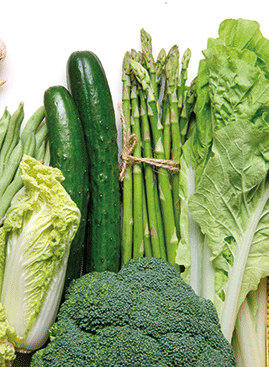
Going organic
The case for choosing organic food is becoming stronger. Rude Health magazine finds out why
What is Organic?
John Halpin, the Health Store, Dundrum: “Organic means food being free from artificial fertilisers, pesticides, and also from being of GMO (Genetically Modified Organism) origin.”
Gillian Westbrook of the Irish Organic Farmers & Growers Association (IOFGA): “Organic regulations cover the entire food chain, from farm production, right through to the processing and packaging stage. Organic has a set of principles that aim to safeguard our environment, improve animal welfare and produce clean, safe food for the consumer. Many substances and ingredients are prohibited in organic food. Therefore organic meat cannot have been fed cereals that contain GMOs, or cereals that have been sprayed with synthetic herbicides prior to harvest. The same applies to all organic food, fruit, vegetables, dairy produce, oils and so on. IOFGA oversee the inspection process and test 5% of all producers to check there is no presence of non-permitted residues in the food. So organic food is much more about what’s not in it as opposed to what is.”
Look for logos
Gillian Westbrook: “In order for a food to be described as organic it has to be certified organic; that means it has to be approved and licensed by an organic certification body, such as IOFGA. The certification logo will appear on the food as will the EU organic leaf logo.”
There are two organic certification bodies in Ireland. Both are authorised by the Department of Agriculture, Food and the Marine.
IOFGA (Irish Organic Farmers and Growers Association) are the largest certifying body in Ireland and they certify primary producers and processors throughout the country. iofga.org
The Organic Trust features on the bulk of Irish-produced organic products in Ireland and is the organic certification body of choice for the professional organic producer. www.organictrust.ie
When buying organic products, look for those labelled with either the Organic Trust or IOFGA logo, the words ‘Certified Organic’ or the code IE-ORG-03.
Is organic more expensive?
Organic products tend to be more expensive than conventional equivalents for a number of reasons. They have not been forced to grow bigger using hormones, artificial pesticides or fertilisers; the farming of them tends to be more labour intensive and produce has a shorter shelf life due to not being irradiated or exposed to other chemical preservation methods. Many people believe that these benefits far outweigh the increase in cost.
Gillian Westbrook: “Some organic food, chicken being a good example, is more expensive. An organic chicken takes up to three times longer to grow, has very strict controls about the area and space it requires and the quality of its feed. As no GMO’s or undesirable substances are allowed, organic chicken feed costs more. This of course increases the production costs considerably. However, the taste is also completely different.”
Pesticides in surprising places
Pesticides in Your Daily Bread: A consumer guide to pesticides in bread published by Pesticide Action Network UK found that between 2000 and 2013 nearly two-thirds of all bread samples tested by the Defra Expert Committee on Pesticide Residues in Food (PRIF) were contaminated with pesticide residues.
The most frequently found pesticide residues in bread were glyphosate and chlormequat. Studies have shown that even very low doses of certain pesticides ingested regularly and in combination with other chemicals people are exposed to on a daily basis could have unforeseen effects.
The only way you can avoid pesticide residues with any degree of confidence is by choosing to eat organic breads sold in health stores and bakeries and farmers markets or make your own bread with certified organic flour.
Click here to read other Rude Food articles.
Click here to return to the Rude Health Magazine homepage.